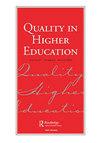Considering the roles of professional accrediting bodies in online programme quality: the case of the NASPAA
IF 1.5
Q3 EDUCATION & EDUCATIONAL RESEARCH
引用次数: 3
Abstract
ABSTRACT While there has been a good deal of discussion of what principles and practices tend to foster online education quality, there has been very little about what professional accrediting bodies at the university level could or should do to ensure appropriate levels of quality. This study uses five practice areas derived from the literature to survey 144 member institutions in the Network of Schools of Public Policy, Affairs, and Administration (NASPAA). The article provides an analysis of the findings related to institutional support, student readiness, faculty (i.e. teaching staff) motivation, course delivery consistency and systemic online quality standards. The findings highlight that explicit use of online quality standards, training of faculty, faculty member motivation to teach online and technical support for faculty and students are the most highly correlated with perceived quality of programme. Generalisable recommendations for practice and considerations for future research are discussed.考虑专业认证机构在在线课程质量中的作用:以美国在线课程质量评估协会(NASPAA)为例
虽然有很多关于促进在线教育质量的原则和实践的讨论,但很少有关于大学级别的专业认证机构可以或应该做些什么来确保适当的质量水平。本研究从文献中衍生出五个实践领域,对公共政策、事务和管理学院网络(NASPAA)的144个成员机构进行了调查。本文分析了与机构支持、学生准备、教师(即教学人员)动机、课程交付一致性和系统在线质量标准相关的调查结果。研究结果强调,明确使用在线质量标准、对教师的培训、教师在线教学的动机以及对教师和学生的技术支持,与课程的感知质量相关度最高。讨论了对实践的一般性建议和对未来研究的考虑。
本文章由计算机程序翻译,如有差异,请以英文原文为准。
求助全文
约1分钟内获得全文
求助全文
来源期刊

Quality in Higher Education
EDUCATION & EDUCATIONAL RESEARCH-
CiteScore
3.30
自引率
14.30%
发文量
32
期刊介绍:
Quality in Higher Education is aimed at those interested in the theory, practice and policies relating to the control, management and improvement of quality in higher education. The journal is receptive to critical, phenomenological as well as positivistic studies. The journal would like to publish more studies that use hermeneutic, semiotic, ethnographic or dialectical research as well as the more traditional studies based on quantitative surveys and in-depth interviews and focus groups. Papers that have empirical research content are particularly welcome. The editor especially wishes to encourage papers on: reported research results, especially where these assess the impact of quality assurance systems, procedures and methodologies; theoretical analyses of quality and quality initiatives in higher education; comparative evaluation and international aspects of practice and policy with a view to identifying transportable methods, systems and good practice; quality assurance and standards monitoring of transnational higher education; the nature and impact and student feedback; improvements in learning and teaching that impact on quality and standards; links between quality assurance and employability; evaluations of the impact of quality procedures at national level, backed up by research evidence.
 求助内容:
求助内容: 应助结果提醒方式:
应助结果提醒方式:


